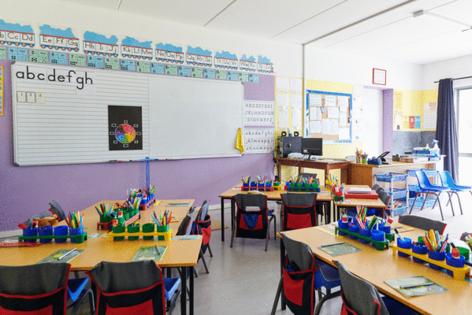Commentary: Teach schools to deal with trauma
Published in Op Eds
Five years after the COVID-19 pandemic closed down schools in March 2020, our children are still suffering from learning loss. Recent results from the National Assessment of Education Progress show the average eighth-grade score down by five points in reading and eight points in math from 2019 assessments.
As districts prioritize professional development for teachers in literacy and math instruction, with mixed results, schools are missing the point. It wasn’t simply a change in instruction that caused learning loss; it was also remote learning and social isolation. COVID-19 exacerbated levels of trauma by isolating children in homes where parents were struggling to maintain employment, coping with illness and loss, and covering for the absence of child care.
Today, students in many schools are at heightened risk of trauma as they worry whether their parents might be snatched away by immigration officials or lose their jobs due to tariffs and federal employee cuts.
Schools need to adopt Trauma-Informed Practices in the Schools, or TIPS, to provide a foundation for learning. The good news is that while TIPS may require a culture shift away from punitive responses to misbehavior, many teachers are naturally good at TIPS and can integrate these into their daily instruction.
The National Child Traumatic Stress Network names four components of trauma-informed schools. To begin, they must realize the widespread impact of trauma. More than two-thirds of children in the United States experience at least one traumatic event before they turn 16 years old. That means that in any classroom, some students will be coping with sudden and overwhelming events — such as a natural disaster, car accident or violent crime — that cause significant distress. Others will be suffering chronic trauma such as domestic violence, child abuse or neglect. Still others will be enduring complex trauma with a variety of overlapping and continually harmful experiences.
While some children demonstrate resilience in the face of adversity, others struggle to manage the symptoms of traumatic stress. Schools must learn to recognize the signs and symptoms of trauma, which can be mistaken for learning disabilities.
Often, trauma will lead to emotional outbursts, aggression or other types of distress that can be mistaken for emotional disturbance or defiance. When symptoms of trauma are matched with interventions that fail to recognize the root cause as trauma, symptoms are exacerbated.
Schools must respond in a trauma-informed way. It is important to create a classroom environment where students feel safe and a sense of belonging. Teachers can check in and see how their students are doing beyond the classroom. When problems arise, the adults can remain calm, curious and empathetic.
Finally, schools must resist re-traumatization of students in the school environment, which can happen when schools punish or exclude students for symptoms of trauma. Schools do harm when students feel misunderstood by their teachers and other educators. It is important to listen to students’ perspectives and incorporate their needs.
A trauma-informed approach doesn’t mean lowering expectations for student performance or behavior. Schools should not reinforce poor behavior by offering rewards for students when they can’t cope in the classroom. Instead, interventions should be done while maintaining students’ sense of belonging. In fact, a trauma-informed approach helps all students.
A teacher trainee once asked me, “You mean teachers are responsible for their students’ mental health?” While the idealistic answer is “Yes,” it is also true that teachers already have enough on their plate. Yet if the underlying trauma students are experiencing is not addressed, teachers’ jobs will become harder.
TIPs can bridge that gap by becoming an integral part of teacher education. It can help schools and teachers create the structure, routine and social opportunities they need to thrive.
____
Jill Sharkey, Ph.D, is a public voices fellow of the OpEd Project and a professor of school psychology at the University of California, Santa Barbara. This column was produced for Progressive Perspectives, a project of The Progressive magazine, and distributed by Tribune News Service.
_____
©2025 Tribune Content Agency, LLC.




























































Comments